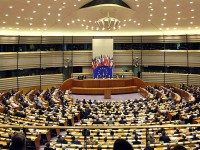 European leaders are bracing for an electoral surge next spring by parties hostile to the European Union—a potential setback to more established parties that could hamper EU efforts to pursue far-reaching policies.
European leaders are bracing for an electoral surge next spring by parties hostile to the European Union—a potential setback to more established parties that could hamper EU efforts to pursue far-reaching policies.
Voters in the bloc’s 28 countries go to the polls May 22-25 to choose members for the 751-member European Parliament. Populist parties have begun battling fiercely for seats, and with anti-EU sentiment high and turnout forecast to be low, polls show they will likely make significant inroads.
“There is a possibility that they will be able to block important steps that are needed,” said Jan Philipp Albrecht, a German member of parliament from the Green Party. “That would be terrible, because it would harm the possibility for European policies and for solutions.”
Supporters of the anti-EU parties say they hope that gains in the European elections will provide a platform for them to advance their cause in national politics.
With the debt crisis forcing national governments to press ahead with unpopular budgetary measures, voter discontent has fueled support for parties pushing stricter immigration controls and withdrawal from the single currency.
Last year showed many gaining ground. In Austria, the far-right Freedom Party won a record 20.7% in September’s elections, denting the support of its mainstream adversaries. The grand coalition between the Social Democrats and the Conservatives reached only a narrow majority of 50.9%, the smallest share of the vote the two parties garnered jointly since World War II.
In Sweden, like other Nordic countries, anti-immigration parties are increasingly holding the balance of power. The far-right Democratic Party is now the country’s third-largest, and has been draining support from the ruling center-right coalition.
In France, some pollsters predict the National Front, led by Marine Le Pen, will take first place in the May election, darting ahead of the governing Socialists and of the divided conservative opposition.
Still, it isn’t clear whether the colorful array of nationalist parties, including Belgium’s Vlaams Belang and Italy’s Northern League, can set aside their differences—including divergent approaches to ethnic minorities and gay rights—long enough to create a functioning alliance.
In the European Parliament, a political group must have at least 25 members, drawn from seven or more countries, to earn funding and influential positions. (The Parliament divides its time between Brussels and Strasbourg, France.)
Populist parties are now trying to build on the surging support in their home countries to create a potent international network.
Ms. Le Pen and Dutch Freedom Party leader Geert Wilders said last month they are forging an alliance for the May election. Ms. Le Pen also has been cultivating ties with Austria’s FPO. Mr. Wilders, whose party until last year was part of the Netherlands’ ruling coalition, has forged links with Vlaams Belang and others.
This is intended to prepare for action in the European Parliament. “One can envisage proposing the return of entire areas of national sovereignty,” Ms. Le Pen said in interview at the party’s headquarters outside Paris. “What has been done in one direction can be very well done in the other.”
Some political analysts estimate that the so-called euroskeptics could make up as much as 30% of the next parliament, though that includes relative moderates such as those aligned with the British Conservative party. Such a presence could allow the anti-EU forces in parliament to block initiatives on everything from finances to immigration to the environment.
“We could be numerous enough to prevent the passage of directives that seem to us against the interest of our people,” said Ms. Le Pen.
Yet fractures are already appearing. Nigel Farage, chief of the influential U.K. Independence Party and a longtime EU critic, has declined to link up with Ms. Le Pen’s party. Ms. Le Pen herself has said she wouldn’t align with more extreme parties like Greece’s Golden Dawn and Hungary’s Jobbik.
Previous attempts at cooperation by the far right in Brussels were defeated by national rivalries and policy disagreements. A far-right coalition formed in 2007 broke up within months after Alessandra Mussolini, an Italian MEP and granddaughter of the fascist dictator, suggested Romanians living in Italy were criminals.
Even if the anti-EU forces can’t create a formal alliance, they could make one of the EU’s central institutions a platform for impassioned anti-EU speeches. Members wreaking havoc in a European Parliament whose existence they oppose could threaten EU leaders’ current efforts to regain voters’ trust.
“The behavior in the European Parliament of some elements on the right shows they’re not in it for democracy,” said Edward McMillan-Scott, a British member of parliament from the centrist Alliance of Liberals and Democrats. “They’re in it for demagoguery, and they use the parliament as a platform.”
It could also mean the only way for the parliament to pass legislation is for its large center-right and center-left blocs to join forces. Some EU advocates warn that this would lead to cautious, tepid laws that will only increase disenchantment with the EU.
“Even if they don’t have a [formal] group, they will mess up the whole situation,” Mr. Albrecht said.